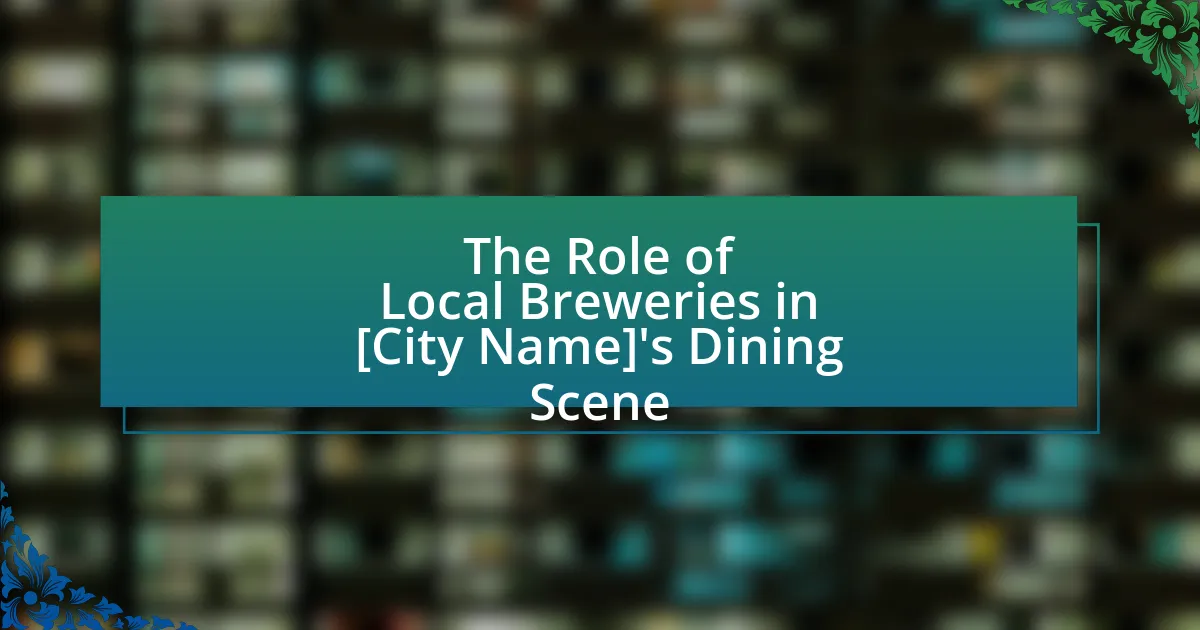Food festivals in [City Name] are events that celebrate the region’s unique culinary heritage, featuring local dishes, ingredients, and cooking traditions. These festivals provide a platform for local chefs and artisans to showcase their creations through tastings, cooking demonstrations, and competitions, promoting community engagement and supporting local businesses. The article explores how food festivals highlight local flavors, the types of cuisines featured, the role of chefs, and the economic and cultural benefits they bring to the community. Additionally, it discusses the timing of these festivals, sustainability initiatives, and tips for attendees to enhance their experience.
![What are Food Festivals in [City Name]?](/wp-content/uploads/What-are-Food-Festivals-in-[City-Name]-1.webp)
What are Food Festivals in [City Name]?
Food festivals in a city are events that celebrate local cuisine, showcasing a variety of dishes, ingredients, and culinary traditions unique to that area. These festivals often feature food vendors, cooking demonstrations, and tastings, allowing attendees to experience the region’s flavors and culinary heritage. For example, in cities like New Orleans, the French Quarter Festival highlights local Creole and Cajun dishes, while in Chicago, the Chicago Gourmet festival showcases the city’s diverse culinary scene. Such events not only promote local food culture but also support local businesses and foster community engagement.
How do Food Festivals celebrate local flavors?
Food festivals celebrate local flavors by showcasing regional ingredients and traditional culinary practices. These events often feature local chefs and food artisans who prepare dishes that highlight the unique tastes and cultural heritage of the area. For example, festivals may include cooking demonstrations, tastings, and competitions that emphasize the use of locally sourced produce, meats, and spices. This approach not only promotes local agriculture but also fosters community pride and awareness of the region’s culinary identity. Additionally, food festivals often incorporate educational components, such as workshops and talks, that inform attendees about the significance of local flavors and sustainable practices, further enhancing the celebration of the area’s gastronomic culture.
What types of local cuisines are featured at these festivals?
Local cuisines featured at these festivals include traditional dishes that reflect the region’s cultural heritage, such as seafood paella, artisanal cheeses, and locally sourced meats. These festivals often showcase specific culinary styles, like farm-to-table offerings, ethnic foods representing immigrant communities, and seasonal specialties that highlight local ingredients. For example, in coastal areas, seafood dishes are prevalent, while inland festivals may emphasize hearty stews and baked goods. The diversity of local cuisines at these events illustrates the unique flavors and cooking techniques that define the area’s gastronomic identity.
How do local chefs contribute to the festival experience?
Local chefs enhance the festival experience by showcasing regional cuisine and culinary traditions. They create unique dishes that reflect the local culture, using fresh, locally sourced ingredients, which not only supports local farmers but also provides festival-goers with an authentic taste of the area. For instance, at food festivals, chefs often participate in cooking demonstrations and workshops, allowing attendees to learn about cooking techniques and the significance of local ingredients. This engagement fosters a deeper appreciation for the culinary arts and the community’s heritage, making the festival a more immersive and educational experience.
Why are Food Festivals important for the community?
Food festivals are important for the community because they foster local economic growth and cultural exchange. These events attract visitors, which boosts sales for local businesses, including restaurants, farmers, and artisans. For instance, a study by the National Endowment for the Arts found that food festivals can generate significant revenue, with some events bringing in over $1 million in economic impact for the host community. Additionally, food festivals promote cultural diversity by showcasing various cuisines and traditions, enhancing community cohesion and pride.
How do they promote local businesses and artisans?
Food festivals in [City Name] promote local businesses and artisans by providing a platform for them to showcase their products and services directly to the community. These events often feature booths and stalls where local vendors can sell their food, crafts, and other goods, allowing them to reach a larger audience. Additionally, food festivals frequently include cooking demonstrations, workshops, and tastings that highlight local ingredients and culinary traditions, further enhancing visibility for local artisans. According to a study by the National Endowment for the Arts, community events like food festivals can increase local economic activity by up to 20%, demonstrating their effectiveness in supporting local businesses.
What role do they play in cultural exchange?
Food festivals play a significant role in cultural exchange by showcasing diverse culinary traditions and fostering community interaction. These events allow participants to experience and appreciate different cultures through food, which serves as a universal language. For example, food festivals often feature traditional dishes, cooking demonstrations, and cultural performances that highlight the heritage of various communities. This not only promotes understanding and respect among different cultural groups but also encourages the sharing of recipes and cooking techniques, further enriching the cultural tapestry of the host city.
When do Food Festivals typically occur in [City Name]?
Food festivals in the city typically occur during the spring and summer months, particularly from April to September. This timeframe aligns with the growing season, allowing local producers to showcase fresh ingredients and seasonal dishes. Many cities host annual food festivals during weekends to attract larger crowds, often coinciding with local holidays or events to maximize participation and community engagement.
What seasonal factors influence the timing of these festivals?
Seasonal factors that influence the timing of food festivals include climate, agricultural cycles, and local harvests. For instance, festivals often coincide with the peak harvest season of specific crops, ensuring the freshest ingredients are available for culinary showcases. Additionally, favorable weather conditions, such as mild temperatures and low precipitation, enhance outdoor festivities, attracting larger crowds. Historical data shows that many food festivals are scheduled during spring and fall, aligning with the abundance of seasonal produce, which is critical for promoting local flavors and culinary traditions.
How can attendees find out about upcoming festivals?
Attendees can find out about upcoming festivals by checking local event calendars, social media platforms, and official city websites. Local event calendars often list various festivals, including food festivals, with dates and details. Social media platforms, such as Facebook and Instagram, frequently feature event pages and posts from organizers promoting their festivals. Official city websites typically provide information on community events, including food festivals, ensuring attendees have access to accurate and timely details.
![What are the most popular Food Festivals in [City Name]?](/wp-content/uploads/What-are-the-most-popular-Food-Festivals-in-[City-Name]-2.webp)
What are the most popular Food Festivals in [City Name]?
It is not possible to answer the question about the most popular food festivals in a specific city without knowing the name of the city. Please provide the city name for a precise response.
Which festivals are known for their unique offerings?
Food festivals known for their unique offerings include the New Orleans Jazz & Heritage Festival, which celebrates local music and cuisine, and the Oktoberfest in Munich, famous for its traditional German beers and foods. These festivals attract millions of visitors annually, showcasing regional specialties and cultural heritage. For instance, the New Orleans festival features dishes like gumbo and jambalaya, while Oktoberfest offers pretzels and bratwurst, highlighting the distinct culinary traditions of their respective locations.
What distinguishes the [specific festival name] from others?
It is not possible to answer the question as the specific festival name has not been provided. Without this information, a concrete answer cannot be formulated.
How do festival themes vary from year to year?
Festival themes vary from year to year based on cultural trends, local events, and community interests. Each year, organizers may choose themes that reflect current social issues, seasonal ingredients, or historical celebrations relevant to the community. For example, a food festival might focus on sustainability one year, highlighting local organic farms, and then shift to a theme celebrating international cuisines the next year to attract a diverse audience. This adaptability ensures that festivals remain engaging and relevant, drawing in both locals and tourists.
What activities can attendees expect at these festivals?
Attendees at food festivals can expect a variety of activities including food tastings, cooking demonstrations, live music performances, and local vendor markets. Food tastings allow participants to sample diverse dishes from local chefs and restaurants, showcasing the region’s culinary specialties. Cooking demonstrations provide insights into preparation techniques and recipes from renowned chefs, enhancing attendees’ culinary skills. Live music performances create an engaging atmosphere, often featuring local artists that reflect the cultural vibe of the city. Additionally, local vendor markets offer opportunities to purchase fresh produce, artisanal products, and unique food items, supporting local businesses and promoting community engagement.
How do cooking demonstrations enhance the festival experience?
Cooking demonstrations enhance the festival experience by providing interactive learning opportunities that engage attendees. These demonstrations allow participants to observe culinary techniques and gain insights into local ingredients, fostering a deeper appreciation for regional cuisine. Research indicates that hands-on experiences, such as cooking demonstrations, increase visitor satisfaction and retention at food festivals, as they create memorable moments that connect people to the culture and traditions of the area.
What entertainment options are typically available?
Entertainment options at food festivals typically include live music performances, cooking demonstrations, food tastings, and interactive workshops. Live music enhances the atmosphere, while cooking demonstrations allow attendees to learn culinary techniques from chefs. Food tastings provide opportunities to sample local dishes, and interactive workshops engage participants in hands-on experiences, fostering a deeper appreciation for local flavors. These elements collectively create a vibrant and immersive experience for festival-goers.
How do Food Festivals support sustainability in [City Name]?
Food festivals in [City Name] support sustainability by promoting local agriculture and reducing carbon footprints associated with food transportation. These events often feature local farmers and producers, encouraging the community to source ingredients from nearby, which minimizes environmental impact. Additionally, many festivals implement waste reduction strategies, such as composting and recycling, to manage food waste effectively. For instance, studies show that local food systems can reduce greenhouse gas emissions by up to 25% compared to conventional food supply chains. By fostering connections between consumers and local food sources, food festivals in [City Name] contribute significantly to sustainable practices within the community.
What initiatives are in place to reduce waste during festivals?
Initiatives to reduce waste during festivals include implementing composting and recycling programs, encouraging the use of reusable containers, and providing educational campaigns about waste reduction. For example, many festivals partner with local waste management organizations to set up designated recycling and composting stations, which can divert up to 50% of waste from landfills. Additionally, some festivals offer incentives for attendees who bring their own reusable items, further minimizing single-use plastics. These measures not only help in reducing waste but also promote environmental awareness among festival-goers.
How do festivals promote local, sustainable sourcing of ingredients?
Festivals promote local, sustainable sourcing of ingredients by creating a platform for local farmers and producers to showcase their products directly to consumers. This direct engagement fosters community support for local agriculture, encourages the use of seasonal ingredients, and reduces the carbon footprint associated with transporting food over long distances. For instance, studies have shown that food festivals can increase sales for local vendors by up to 30%, highlighting the economic benefits of supporting local sourcing. Additionally, festivals often feature educational components that inform attendees about the importance of sustainable practices, further reinforcing the connection between local sourcing and environmental stewardship.
![How can attendees make the most of Food Festivals in [City Name]?](/wp-content/uploads/How-can-attendees-make-the-most-of-Food-Festivals-in-[City-Name]-3.webp)
How can attendees make the most of Food Festivals in [City Name]?
Attendees can make the most of Food Festivals in their city by planning their visit in advance, prioritizing must-try dishes, and engaging with local chefs and vendors. Researching the festival schedule allows attendees to identify key events, such as cooking demonstrations or tastings, ensuring they do not miss unique experiences. Additionally, sampling a variety of foods from different vendors helps attendees appreciate the local culinary scene, which is often highlighted by the festival’s focus on regional ingredients and traditional recipes. Engaging with chefs and vendors provides insights into the food culture and enhances the overall experience, as many festivals feature local artisans who share their stories and techniques.
What tips should first-time attendees consider?
First-time attendees at food festivals should prioritize planning their visit by researching the festival schedule and vendor list in advance. This preparation allows attendees to identify must-try dishes and avoid long lines for popular food items. Additionally, arriving early can enhance the experience by providing access to a wider selection of food and fewer crowds. It is also advisable to bring cash, as some vendors may not accept cards, ensuring a smoother transaction process. Lastly, staying hydrated and taking breaks will help maintain energy levels throughout the event, allowing attendees to fully enjoy the diverse culinary offerings.
How can attendees plan their visit to maximize enjoyment?
Attendees can maximize enjoyment at food festivals by researching the event schedule and prioritizing must-try food vendors. Planning ahead allows attendees to identify popular dishes and avoid long lines, enhancing their overall experience. For instance, festivals often feature local specialties that reflect the region’s culinary heritage, making it essential to sample these unique offerings. Additionally, checking social media for real-time updates and reviews can provide insights into the best food options and activities available during the festival.
What should attendees bring to enhance their experience?
Attendees should bring reusable utensils, plates, and napkins to enhance their experience at food festivals. These items promote sustainability by reducing waste, which is increasingly important at events that generate significant food-related refuse. Additionally, having personal utensils can improve hygiene and comfort while enjoying various local flavors, as many food vendors may not provide these items.
What are common challenges faced at Food Festivals?
Common challenges faced at food festivals include logistical issues, vendor management, and crowd control. Logistical issues often arise from inadequate infrastructure, such as insufficient restroom facilities or lack of proper waste management systems, which can lead to unsatisfactory attendee experiences. Vendor management challenges occur when coordinating multiple food vendors, ensuring compliance with health regulations, and maintaining quality standards. Additionally, crowd control is critical, as large gatherings can lead to safety concerns, traffic congestion, and difficulties in managing lines, which can detract from the overall enjoyment of the festival. These challenges are frequently reported in event planning literature, highlighting the need for thorough preparation and effective management strategies.
How can attendees navigate large crowds effectively?
Attendees can navigate large crowds effectively by planning their visit in advance, utilizing maps or apps for layout orientation, and identifying less crowded times for attendance. Research indicates that arriving early or during off-peak hours can significantly reduce wait times and enhance the overall experience at events like food festivals. Additionally, maintaining awareness of exits and rest areas can facilitate smoother movement through dense areas, as evidenced by crowd management studies that emphasize the importance of strategic positioning and flow management in large gatherings.
What strategies can help in managing food allergies or dietary restrictions?
To manage food allergies or dietary restrictions effectively, individuals should prioritize clear communication about their needs. This involves informing restaurant staff about specific allergies or dietary requirements before ordering, ensuring that food preparation methods are safe. Additionally, individuals can benefit from reading ingredient labels meticulously and researching food options in advance, especially when attending events like food festivals. Studies indicate that proactive measures, such as carrying emergency medication like epinephrine auto-injectors for severe allergies, significantly reduce the risk of allergic reactions. Furthermore, joining support groups can provide valuable resources and shared experiences, enhancing one’s ability to navigate dietary challenges.
What resources are available for staying updated on Food Festivals?
To stay updated on food festivals, individuals can utilize various resources such as local event calendars, social media platforms, and dedicated food festival websites. Local event calendars, often maintained by city tourism boards or community organizations, provide comprehensive listings of upcoming food festivals, including dates and locations. Social media platforms like Facebook and Instagram allow users to follow specific food festival pages or hashtags, ensuring real-time updates and announcements. Additionally, websites like FoodFestival.com aggregate information on food festivals across different regions, offering details on schedules and ticketing. These resources collectively ensure that enthusiasts remain informed about the latest food festival happenings.
How can social media be used to follow festival news and updates?
Social media can be used to follow festival news and updates by subscribing to official festival pages and hashtags on platforms like Facebook, Twitter, and Instagram. These platforms provide real-time information, including schedules, vendor announcements, and special events, allowing users to stay informed about any changes or highlights. For instance, many festivals utilize live updates and stories to engage their audience, ensuring that followers receive immediate notifications about important developments.
What local websites or apps provide festival information?
Local websites and apps that provide festival information include Eventbrite, which lists various local events including food festivals, and Facebook Events, where users can find community gatherings and festivals. Additionally, local tourism websites often feature festival calendars, such as the official city tourism site, which provides detailed information on upcoming food festivals and related events. These platforms aggregate event details, making it easy for users to discover and plan for local food festivals.
![Food Festivals in [City Name]: Celebrating Local Flavors](https://cityofleadville.com/wp-content/uploads/Featured-image-Food-Festivals-in-City-Name-Celebrating-Local-Flavors-768x403.webp)



